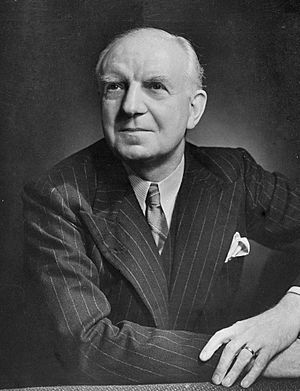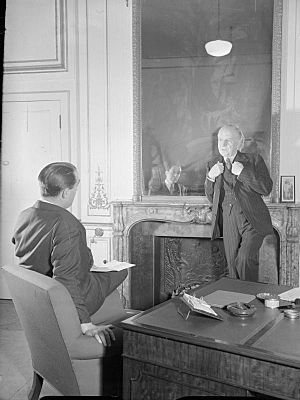Frederick Marquis, 1st Earl of Woolton facts for kids
Quick facts for kids
The Earl of Woolton
|
|
|---|---|
 |
|
| Chairman of the Conservative Party | |
| In office 1 July 1946 – 1 November 1955 |
|
| Preceded by | Ralph Assheton |
| Succeeded by | Oliver Poole |
| Chancellor of the Duchy of Lancaster | |
| In office 24 November 1952 – 20 December 1955 |
|
| Monarch | Elizabeth II |
| Prime Minister | Winston Churchill |
| Preceded by | The Viscount Swinton |
| Succeeded by | The Earl of Selkirk |
| Minister of Materials | |
| In office 1 September 1953 – 16 August 1954 |
|
| Monarch | Elizabeth II |
| Prime Minister | Winston Churchill |
| Preceded by | Arthur Salter |
| Succeeded by | Office abolished |
| Lord President of the Council | |
| In office 28 October 1951 – 24 November 1952 |
|
| Monarch | George VI Elizabeth II |
| Prime Minister | Winston Churchill |
| Preceded by | The Viscount Addison |
| Succeeded by | The Marquess of Salisbury |
| In office 28 May 1945 – 27 July 1945 |
|
| Monarch | George VI |
| Prime Minister | Winston Churchill |
| Preceded by | Clement Attlee |
| Succeeded by | Herbert Morrison |
| Minister of Reconstruction | |
| In office 11 November 1943 – 23 May 1945 |
|
| Monarch | George VI |
| Prime Minister | Winston Churchill |
| Preceded by | Position created |
| Succeeded by | Position abolished |
| Minister of Food | |
| In office 3 April 1940 – 11 November 1943 |
|
| Monarch | George VI |
| Prime Minister | Winston Churchill |
| Preceded by | William Morrison |
| Succeeded by | John Llewellin |
| Member of the House of Lords Lord Temporal |
|
| In office 7 July 1939 – 14 December 1964 as a hereditary peer |
|
| Preceded by | Peerage created |
| Succeeded by | The 2nd Earl of Woolton |
| Personal details | |
| Born |
Frederick James Marquis
23 August 1883 Ordsall, Salford, Lancashire, England |
| Died | 14 December 1964 (aged 81) Arundel, Sussex, England |
| Political party | Conservative |
| Alma mater | Victoria University of Manchester |
| Occupation | Businessman, politician |
Frederick James Marquis, 1st Earl of Woolton (born August 23, 1883 – died December 14, 1964) was an important English businessman and politician. He is best known for his work during World War II as the Minister of Food. He also led the Conservative Party as its chairman from 1946 to 1955.
As Minister of Food, he created a system for rationing food. This helped make sure everyone got enough to eat during the war. He also made sure food kept arriving from America. A special vegetarian dish called the Woolton pie was named after him. This pie was created because meat and dairy were scarce during the war. Later, he became the Minister of Reconstruction, planning how Britain would rebuild after the war.
Contents
Early Life and Career
Frederick James Marquis was born in 1883 in Ordsall, Salford, England. He was the only child of Thomas Robert Marquis and Margaret Marquis. He went to Manchester Grammar School and the University of Manchester.
Woolton first wanted to study social sciences at university. However, his family's money problems stopped him. He became a mathematics teacher at Burnley Grammar School instead. In 1910, he became a research fellow in Economics at the University of Manchester. He earned his Master of Arts degree there in 1912.
During World War I, Woolton was not fit for military service. He worked for the government, first at the War Office. After the war, he joined Lewis's department store in Liverpool. He became a director in 1928 and chairman in 1936.
In 1938, he decided his stores would stop selling goods from Nazi Germany. This was after Germany took over Austria. Even though many people supported him, the government criticized him. They wanted to avoid upsetting Germany at that time.
Woolton was given the title of Knight in 1935 for his work in British industry. In 1939, he became a Baron, a type of noble title. He chose the name Baron Woolton after the Liverpool suburb where he lived. He served on several government committees but did not join any political party at first.
Helping Britain During World War II
In April 1940, Neville Chamberlain made Woolton the Minister of Food. This was a very important job during the war. Woolton was in charge of 50,000 workers and many local offices. These offices gave out ration cards to people.
His main goal was to make sure everyone in Britain had enough food. Food supplies were low because of enemy attacks and the needs of the military. So, rationing was necessary. Woolton and his team created a successful system. People received points each month to spend on food they wanted.
In June 1940, when a German invasion seemed possible, Woolton told the public not to worry. He said there were enough emergency food supplies for "weeks and weeks." He also stored "iron rations" for major emergencies. When the Blitz (German bombing raids) started, he set up over 200 feeding stations in cities.
Food Rationing and Woolton Pie
Woolton had to manage food shortages during the war. He knew it wasn't enough to just limit food. He also needed to tell people why it was important. He explained that meat, cheese, bacon, and eggs were very hard to get. He encouraged people to eat simpler meals. There was plenty of bread, potatoes, vegetable oils, fats, and milk.
By 1941, Britain's usual food imports had dropped by half. But by 1942, lots of food arrived from the U.S. and Canada through programs like Lend Lease. Woolton cared about children's health. By 1942, 650,000 children received free school meals. Also, about 3.5 million children got milk at school.
He kept food prices low by helping to pay for eggs and other items. He also promoted recipes that worked with rationing. The famous "Woolton pie" was one of these. It was made from carrots, parsnips, potatoes, and turnips in oatmeal, with a pastry or potato top. Woolton's business skills made his ministry a success. People liked him a lot, even with the food shortages.
Planning for Post-War Britain
In 1940, Woolton became a member of the Privy Council. In 1942, he received the Order of the Companions of Honour. In 1943, Woolton joined the War Cabinet as Minister of Reconstruction. His job was to plan how Britain would rebuild after the war. This was a very challenging task.
In May 1945, he was part of Churchill's "Caretaker" government. He served as Lord President of the Council during this time.
Rebuilding the Conservative Party
In July 1945, Churchill's government lost the election. The next day, Woolton officially joined the Conservative Party. He was quickly made the party's chairman. His job was to make the party stronger and prepare it for future elections.
Woolton made many big changes to the Conservative Party. He focused on getting more members and raising money. He also created a clear message for the party to share with the public. To help more people become candidates, the party gave them financial help. Woolton is often given credit for the Conservative victory in the 1951 election. This was their first win since 1935.
In 1953, he was given the title Viscount Woolton. In 1956, he received an even higher honor, becoming Earl of Woolton.
Later Life and Legacy
Lord Woolton passed away on December 14, 1964, at his home in Arundel, Sussex. His titles were passed on to his son, Roger. He is buried at St Mary's Church in Walberton, Sussex.
 | Aurelia Browder |
 | Nannie Helen Burroughs |
 | Michelle Alexander |


